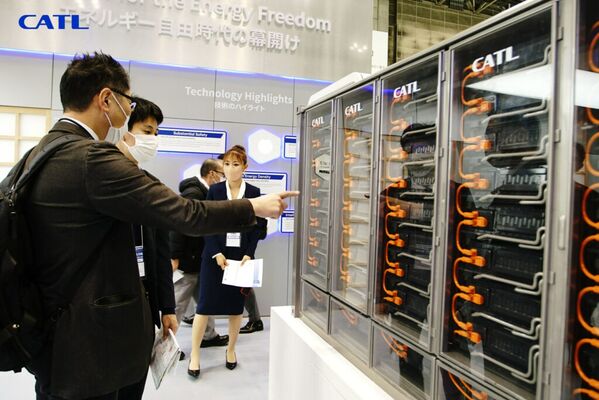Revolutionising Japan's Energy Landscape: Chinese Giants Bring Battery Storage Solutions

I. Introduction
Japan has been making significant strides in embracing clean energy solutions in recent years. With a strong commitment to reduce greenhouse gas emissions and promote renewable energy sources, the country is actively pursuing energy storage solutions. The Japanese market has captured the attention of major Chinese players in the clean energy sector, namely Contemporary Amperex Technology Ltd (CATL), JinkoSolar, and Sungrow. These companies are keen on providing innovative battery storage solutions to meet Japan's growing energy demands.
II. Key Chinese Players in the Japanese Market
A. Contemporary Amperex Technology Ltd (CATL)
CATL is a leading global supplier of lithium-ion batteries and energy storage systems. With its cutting-edge technology and extensive experience in providing batteries for electric vehicles (EVs) and energy storage applications, CATL is well-positioned to cater to Japan's evolving energy needs. The company's solutions offer high energy density, long cycle life, and excellent safety, making them suitable for the Japanese market.
B. JinkoSolar
JinkoSolar is one of the world's largest solar module manufacturers. The company's advanced solar panels and battery storage solutions are designed to provide efficient, reliable, and cost-effective clean energy. JinkoSolar's entry into the Japanese market signifies its commitment to help the country meet its renewable energy goals while also expanding its global footprint.
C. Sungrow
Sungrow is a renowned manufacturer of solar inverters and energy storage systems. The company's products are known for their reliability, high efficiency, and smart operation. Sungrow's solutions can be seamlessly integrated with Japan's existing energy infrastructure, making them an attractive option for the country's growing clean energy market.
III. Factors Attracting Chinese Companies to the Japanese Market
Japan's increasing demand for renewable energy and energy storage solutions is driven by the government's ambitious goals to achieve carbon neutrality by 2050. Incentive schemes, such as feed-in tariffs and subsidies, have been introduced to encourage the adoption of clean energy technologies. These market opportunities and potential for growth are attracting Chinese companies, who are eager to establish a strong presence in the Japanese energy storage sector.
IV. Potential Challenges for Chinese Companies in Japan
Despite the promising market conditions, Chinese companies may face competition from established Japanese energy storage providers, such as Panasonic and Toshiba. Additionally, navigating the regulatory landscape and overcoming market entry barriers can be challenging. Chinese companies will also need to address cultural differences and localize their products to appeal to Japanese consumers.
V. Collaboration Opportunities between Chinese and Japanese Companies
Collaborations between Chinese and Japanese companies can open doors for market entry and technology sharing. Joint ventures, partnerships, and cooperative agreements can help both parties expand their supply chains and distribution networks, fostering innovation and growth in the clean energy sector.
VI. Impact on the Japanese Clean Energy Market
The introduction of advanced energy storage technologies from Chinese companies will likely accelerate the adoption of renewable energy in Japan. Increased competition can lead to innovation, driving down costs and making clean energy solutions more affordable for consumers. This, in turn, can contribute to the country's overall progress towards a sustainable and low-carbon future.
VII. Global Implications of Chinese Companies Entering the Japanese Market
The expansion of Chinese companies into Japan's energy storage market is expected to have a ripple effect on international markets, as it encourages global clean energy technology advancements. Moreover, the geopolitical implications of this development can influence future collaborations and market dynamics in the clean energy sector.
VIII. Conclusion
The entry of major Chinese players into Japan's energy storage market signifies an important development in the global clean energy landscape. As CATL, JinkoSolar, and Sungrow make their mark in the Japanese market, they can contribute to the country's ongoing efforts to transition to renewable energy and achieve carbon neutrality. By providing innovative and affordable battery storage solutions, these companies are poised to reshape Japan's energy landscape and help the nation realise its sustainable future.
Collaborations between Chinese and Japanese companies can further promote innovation and growth in the clean energy sector, with both parties benefitting from shared knowledge and resources. Ultimately, the success of these partnerships will play a crucial role in defining the global impact of clean energy technology advancements.
IX. Frequently Asked Questions (FAQs)
- What is the current state of Japan's energy storage market?
Japan's energy storage market is steadily growing as the country aims to achieve carbon neutrality by 2050. The government's incentive schemes and commitment to renewable energy have created a favourable environment for energy storage providers, both domestic and international.
- How are the Chinese companies adapting their products for the Japanese market?
Chinese companies like CATL, JinkoSolar, and Sungrow are tailoring their energy storage solutions to meet Japan's unique needs and requirements. This includes addressing safety concerns, ensuring compatibility with the existing energy infrastructure, and adapting their products to appeal to Japanese consumers.
- What are the potential risks associated with Chinese companies entering the Japanese market?
Chinese companies may face challenges in competing with established Japanese energy storage providers, navigating regulatory barriers, and overcoming cultural differences. These risks can be mitigated through strategic collaborations, localization efforts, and a deep understanding of the Japanese market.
- How can Japanese companies benefit from collaborating with Chinese energy storage providers?
Collaborations with Chinese energy storage providers can help Japanese companies gain access to advanced technologies, expand their supply chains, and enhance their distribution networks. These partnerships can also foster innovation and growth in the clean energy sector, ultimately benefiting both parties.
- What are the long-term implications of Chinese companies' presence in the Japanese energy storage market?
The presence of Chinese companies in the Japanese energy storage market can accelerate the adoption of renewable energy and drive down costs, making clean energy solutions more accessible to consumers. This can contribute to Japan's progress towards a sustainable and low-carbon future and encourage further innovation and collaboration in the global clean energy sector.
